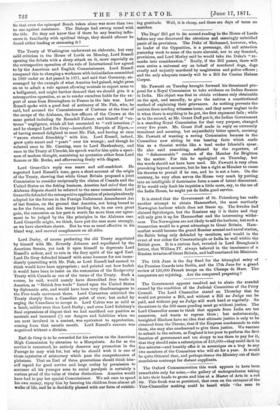Mr. Fawcett on Tuesday brought forward his threatened pro- posal
for a Royal Commission to take evidence on Indian finance- in India. His object was first to obtain evidence only obtainable' on the spot, and secondly, to give the natives a constitutional method of explaining their grievances. As nothing prevents the from sending witnesses home, and they never neglect to do- lt when there is anything to be got, the first argument fails ; while. as to the second, as Mr. Grant Duff put it, the Indian Government is a standing Royal Commission for that very purpose, changed every five years. Mr. Grant Duff made in reply an extremely trenchant and amusing, but unjustifiably bitter speech, accusing Mr. Fawcett of wanting a roving Commission because in the Committee now sitting he was hearing facts which made- him as a theorist writhe like a toad under Ithuriel's spear.. He also said something, softened by the reporters, of the " dishonourable " conduct of the Member for Brighton. in the matter. For this he apologized on Thursday, but the words should not have been used. Mr. Fawcett is very often, provoking beyond measure, but be has a right as Member to cause his theories to prevail if he can, and he is not a bore. On the- contrary, he very often serves the House very much by putting into an intelligible if doctrinaire form a mass of latent discontent.. If he would only limit his inquiries a little more, say, to the use of the India House, he might yet do India good service.


































 Previous page
Previous page